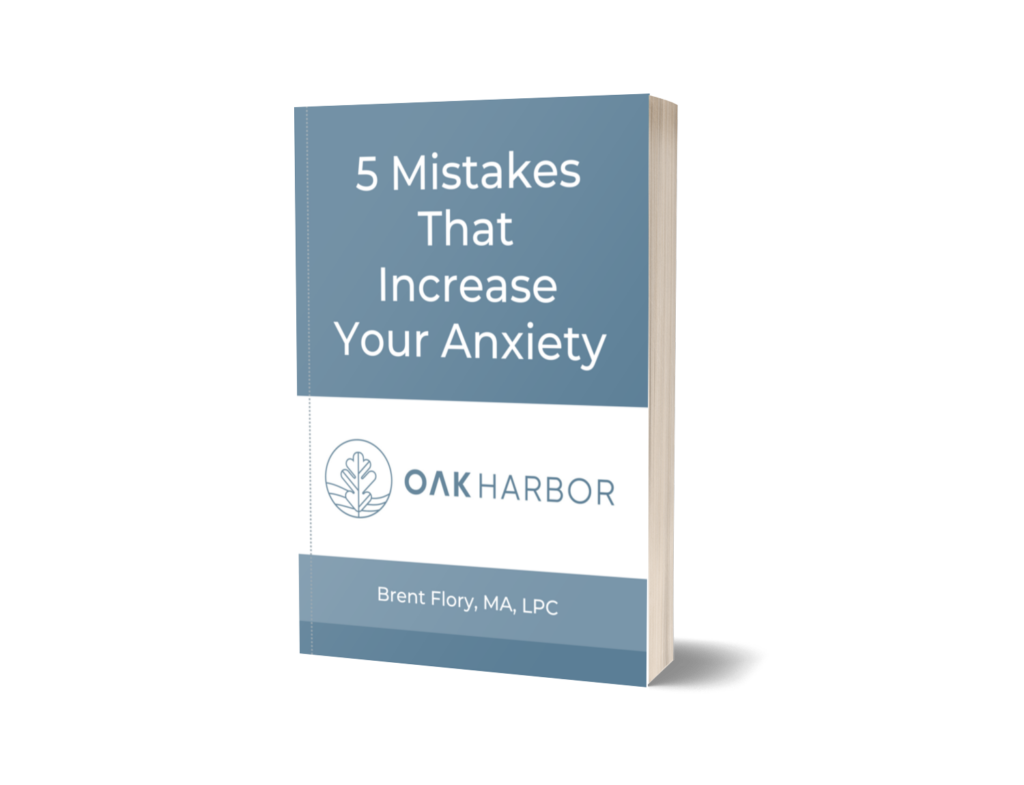No one would argue that it’s important to be able to live in the moment. The sentiment is great, but how do you learn to do that? Is there a tangible skill that can help you be more present in the moment?
Yes, there is.
As a counselor, I think the most powerful skill I teach clients is how to be present. With whomever you are, or in whatever you are doing. The ability to focus is vital for our work and our relationships.
We all tend to get caught up in our heads, or distracted by a variety of things. We are trained by our culture to look for what’s next. From advertising to social media to the news cycle, we are constantly looking for something new to grip our attention.
When things are hard, we imagine how things will get better someday. Whether our struggle is in our career, our health, our relationship with others (or ourselves), we hope life will get better around the corner. We need hope for the future, but we have to live today to have a chance of getting that better future.
Instead of staying stuck thinking about the future, first here’s a few reasons to get better at living in the moment. Then we will get into how to do the skill.
Reasons to Practice Being More Present in the Moment
1. What and who you have in your life today won’t be the same tomorrow.
Most of us have numerous reasons to enjoy life now. From dear friends, to family and children, to enjoying a good book or movie, there is meaning to be found today. Embracing the present is worth the effort.
I’m instinctively drawn towards constantly thinking about what’s next. But my kids will never be this age again. To enjoy them at this age, I need to enjoy them…now.
Being present in the moment is precious because we don’t get now back. And there are no guarantees what’s next will better.
Now is not perfect. For some, now is incredibly painful. For everyone, there are frustrations and pains to deal with.
Even with a better tomorrow, there will be both joys and sorrows. Learning to be present helps you to appreciate the gifts in your life today.
2. You must focus today to change your tomorrow.
Perhaps you find yourself in a difficult situation today. You may dislike your job or be in a difficult relationship. You still need to be able to be present to make a meaningful change.
While patience is a virtue, waiting around for unpleasant circumstances to change on their own isn’t patience. It’s likely a combination of fear and procrastination.
Dreaming about a better tomorrow gets you nowhere without any execution today. Execution takes the ability to focus on the present.
3. Learning to be present today trains you to be present tomorrow.
We become what we do. If I instantly check the notifications on my phone today, then tomorrow I will be really good at checking my phone.
Intimate relationships take attention. Meaningful work takes focus. If you want to enjoy and get better at both in the future, practice being present in the moment today.
The Skill That Empowers You to Make the Most of the Moment
Dropping Anchor is the skill that empowers you to be present in the moment. Like any skill, it takes practice to get good at it. Many of my clients and I have experienced how it enables us to better contact the present moment. Some of my clients have also shared that it helps them clarify their thinking.
I’ve written in the past about how Dropping Anchor is a great tool when you are overwhelmed. It isn’t just for when things are difficult. Much of our distraction comes from technology and even our own mind chattering at us.
I am going to briefly share the three components that make up Dropping Anchor. Then in the following section I will give an at length script on how to practice the skill.
The Three Components of Dropping Anchor
1. Acknowledge your inner experience.
It is impossible to do anything about a problem that we are unaware of or that we refuse to acknowledge. The first step to dropping anchor is to simply notice and acknowledge what I am experiencing.
2. Connect with your body.
The second step is to connect with your body when you’re in stressful circumstances. We have all experienced getting trapped in our heads by fear, anxiety, or reoccurring thoughts. You can reconnect with your body even when you feel overwhelmed. You can’t control what you think and feel. But you can regain a sense of control in an overwhelming situation by moving your body.
3. Engage with the world around you.
The third step is to engage with the world around you. What can you see? Hear? Touch? Taste? Smell? When we find ourselves living in a harsh reality, being in tune with the world around us is difficult. But it is necessary. You can’t take action if you’re trapped in your thoughts and emotions.
Script for How to Drop Anchor
First, get into a comfortable position. For many people, it helps to sit down, straighten your back, and put your feet flat on the floor. You can keep your eyes open, or you can close them.
1. Acknowledge your inner experience.
There are three parts to acknowledging your inner experience. You are going to practice shifting your focus from your thoughts, to your emotions, to scanning your body.
A. Notice your thoughts.
Seek to notice the thoughts cutting across your mind. Don’t put any sort of judgment on them as good or bad, just notice them. You can say something to yourself like, “I’m noticing that I’m having the thought that X.”
B. Notice your emotions.
Next, try to notice what emotions or feelings are rising to the surface. If you can name the emotion, say something to yourself like, “I’m noticing that I’m having a feeling of X.” If you feel numb you can say, “I’m noticing that I am feeling numb.”
C. Scan your body.
Then scan your body. Scan from the top of your head, down your neck, shoulders, and arms all the way down your upper body. Scan down your legs, all the way to your toes. Notice any areas of discomfort or tension in your body.
Notice what your body is experiencing with openness and curiosity. Tap into a curious mindset like a kid who found an insect in the backyard they’ve never seen before.
2. Connect with your body.
After you acknowledge the thoughts, the feelings, and the sensations showing up, shift your focus to your feet. Practice pressing your feet into the floor and put your full attention on what that feels like.
Then straighten your back. Notice how your back is supporting you and giving you strength.
Next, have a good stretch, however you like, however feels comfortable. Stretch where you feel tension or tightness. I tend to carry my stress in my shoulders and neck so I often stretch those areas out. As you’re making these movements, notice how you have control over your body and your actions. Even in the midst of a difficult situation.
You are not trying to distract yourself from or fight the difficult thoughts, feelings, or sensations that are showing up. You want to notice and acknowledge them for what they are. Then you want to practice shifting your attention.
3. Engage with the world around you.
Practice shifting your focus from your inner world to the world outside you. Open your eyes if they aren’t already and notice three or four things that you can see. Take them in as if you’re seeing them for the first time. Notice what you can hear in the room or outside of the room. Finally, engage with the world around you and act on what is most important to you in this moment.
Pointers to Dropping Anchor
Here are a few things to keep in mind with this simple but powerful exercise:
1. Dropping Anchor is very flexible.
The components of dropping anchor are important but how you exercise them is not. In other words, you need to acknowledge, connect, and engage (think ACE), but there are different ways to do so.
For example, imagine you are in a restaurant with a friend. During your conversation, you get caught in your mind by a negative thought. You don’t have to visibly stretch to connect with your body, or look around to engage with the outside world.
Instead, you can subtly rub your fingertips on your jeans and focus on what that feels like. Next, you can focus on the aromas in the restaurant. And then refocus on giving your friend your full attention.
You can also drop anchor quickly. With practice, as you get more comfortable with it, you can learn to Drop Anchor in 10 seconds.
2. You can’t overdo Dropping Anchor.
Overdosing is a serious risk with prescribed medications. If you take a higher dose than prescribed, you could experience more side effects and harm yourself.
Dropping Anchor is nothing like a medication. Some days you may Drop Anchor once or twice, and that is plenty. On a stressful day, you may need to drop anchor more times than you want to count.
That is completely okay. You cannot ‘overdose’ on Dropping Anchor. Its purpose is to help you be present and do what’s most important to you.
Practice
As we all know, learning a new skill takes practice. You won’t remember to use it when life is difficult without practicing it. Here is my prediction; you will get out of Dropping Anchor what you put into it.
If you have learned to play an instrument like the guitar, you have put a lot of time into it to build your skill. Why not practice dropping anchor for 5-10 minutes a day for the next month? Each time you try it, measure on a scale of 1-10 (1 is completely trapped in your thoughts/emotions and 10 is fully present) how present you are before and after doing Dropping Anchor.
Are you struggling with loss & grief, anxiety, or burnout and live in Ohio? Reach out to me at Oak Harbor Counseling Services. My office is conveniently located in northern Columbus. You can learn more about my counseling practice here or email me at [email protected].



